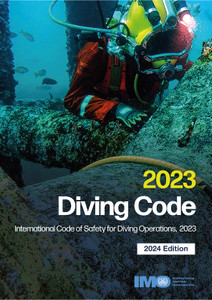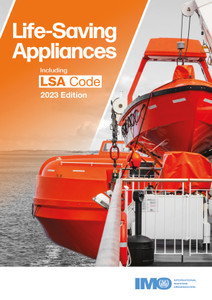
The International Maritime Solid Bulk Cargoes Code (IMSBC Code), adopted on 4 December 2008 by resolution MSC.268(85), entered into force on 1 January 2011, from which date it was made mandatory under the provisions of the SOLAS Convention. The present edition incorporates Amendment 07-23, which may be applied from 1 January 2024 on a voluntary basis, anticipating its envisaged official entry into force on 1 January 2025.
This publication also presents additional information that supplements the IMSBC Code, such as the Code of Practice for the Safe Loading and Unloading of Bulk Carriers (BLU Code, including BLU Manual) and Recommendations on the safe use of pesticides in ships applicable to the fumigation of cargo holds. The IMSBC Code and supplement is commended to Administrations, shipowners, shippers and masters and all others concerned with the standards to be applied in the safe stowage and shipment of solid bulk cargoes, excluding grain.
The International Convention for the Safety of Life at Sea, 1974 (SOLAS Convention), as amended, deals with various aspects of maritime safety and contains, in parts A and B of chapter VI and part A-1 of chapter VII, the mandatory provisions governing the carriage of solid bulk cargoes and the carriage of dangerous goods in solid form in bulk, respectively. These provisions are amplified in the International Maritime Solid Bulk Cargoes Code (IMSBC Code).
Detailed fire-protection arrangements for ships carrying solid bulk cargoes are incorporated into chapter II-2 of the SOLAS Convention by regulations 10 and 19. Attention is drawn to regulation II-2/19.4 of the SOLAS Convention, as amended. This provides for an appropriate document as evidence of compliance of construction and equipment with the requirements of regulation II-2/19 to be issued to ships constructed on or after 1 July 2002 and carrying dangerous goods in solid form in bulk as defined in regulation VII/7 of the Convention, except class 6.2 and class 7.
For: ? cargo ships of 500 gross tonnage or over constructed on or after 1 September 1984 but before 1 July 2002; or ? cargo ships of less than 500 gross tonnage constructed on or after 1 February 1992 but before 1 July 2002,
the requirements of regulation II-2/19 of SOLAS, 1974, as amended by resolutions MSC.1(XLV), MSC.6(48), MSC.13(57), MSC.22(59), MSC.24(60), MSC.27(61), MSC.31(63) and MSC.57(67), apply (see SOLAS regulation II-2/1.2).
For cargo ships of less than 500 gross tonnage constructed on or after 1 September 1984 and before 1 February 1992, it is recommended that Contracting Parties extend such application to these cargo ships as far as possible.
The problems involved in the carriage of bulk cargoes were recognized by the delegates to the 1960 International Conference on Safety of Life at Sea, but at that time it was not possible to frame detailed requirements, except for the carriage of grain. The Conference did recommend, however, in paragraph 55 of Annex D to the Convention, that an internationally acceptable code of safe practice for the shipment of bulk cargoes should be drawn up under the sponsorship of the International Maritime Organization (IMO). This work was undertaken by the Organization?s Sub-Committee on Containers and Cargoes and several editions of the Code of Safe Practice for Solid Bulk Cargoes (BC Code) have been published, since the first edition in 1965. The Sub-Committee was expanded to include dangerous goods and is now called the Sub-Committee on Dangerous Goods, Solid Cargoes and Containers (DSC Sub-Committee).*
The prime hazards associated with the shipment of solid bulk cargoes are those relating to structural damage due to improper cargo distribution, loss or reduction of stability during a voyage and chemical reactions of cargoes. Therefore the primary aim of this Code is to facilitate the safe stowage and shipment of solid bulk cargoes by providing information on the dangers associated with the shipment of certain types of solid bulk cargoes and instructions on the procedures to be adopted when the shipment of solid bulk cargoes is contemplated. The requirements for the transport of grain are covered by the International Code for the Safe Carriage of Grain in Bulk (International Grain Code, 1991).
* From 1 January 2014, the DSC Sub-Committee was replaced by the Sub-Committee on Carriage of Cargoes and Containers (CCC Sub-Committee).
The IMSBC Code that was adopted by resolution MSC.268(85)* was for adoption and implementation of Governments or for use as the basis for national regulations in pursuance of their obligations under regulation of the SOLAS Convention, as amended. The Code is mandatory under the provision of the SOLAS Convention from 1 January 2011. However, some parts of the Code continue to be recommendatory or informative. It needs to be emphasized that in the context of the language of the Code, the words ?shall?, ?should? and ?may?, when used in the Code, mean that the relevant provisions are ?mandatory?, ?recommendatory? and ?optional?, respectively. Observance of the Code harmonizes the practices and procedures to be followed and the appropriate precautions to be taken in the loading, trimming, carriage and discharge of solid bulk cargoes when transported by sea, ensuring compliance with the mandatory provisions of the SOLAS Convention.
The Code has undergone many changes, both in layout and content, in order to keep pace with the expansion and progress of industry. The Maritime Safety Committee (MSC) is authorized by the Organization?s Assembly to adopt amendments to the Code, thus enabling IMO to respond promptly to developments in transport.
v. Preamble
IMSBC Code
1. International Maritime Solid Bulk Cargoes Code
Supplement
BLU Code
573. Code of Practice for the Safe Loading and Unloading of Bulk Carriers.
BLU Manual
605. Manual on loading and unloading of solid bulk cargoes for terminal representatives.
Uniform method of measurement of the density of bulk cargoes
651. MSC/Circ.908 (4 June 1999)
Lists of solid bulk cargoes for which a fixed gas fire-extinguishing system may be exempted
or for which a fixed gas fire-extinguishing system is ineffective
657. MSC.1/Circ.1395/Rev.6 (26 June 2023)
Revised recommendations for entering enclosed spaces aboard ships
665. Resolution A.1050(27) (30 November 2011)
Recommendations on the safe use of pesticides in ships applicable
to the fumigation of cargo holds
667. MSC.1/Circ.1264 (27 May 2008)
Amendment to the Recommendations on the safe use of pesticides in ships
applicable to the fumigation of cargo holds (MSC.1/Circ.1264)
693. MSC.1/Circ.1396 (16 June 2011)
Guidelines for the submission of information and completion of the format for the properties
of cargoes not listed in the International Maritime Solid Bulk Cargoes
(IMSBC) Code and their conditions of carriage
697. MSC.1/Circ.1453/Rev.2 (26 June 2023)
Guidelines for developing and approving procedures for sampling, testing and controlling
the moisture content for solid bulk cargoes which may liquefy or undergo dynamic separation
705. MSC.1/Circ.1454/Rev.2 (26 June 2023)
Guidance for conducting the refined MHB (CR) test
713. MSC.1/Circ.1600/Rev.1 (28 April 2022)
Contact names and addresses of designated national competent authorities
721. responsible for the safe carriage of grain and solid bulk cargoes
IMO
As a specialised agency of the United Nations, the International Maritime Organization (IMO) is the global standard-setting authority for the safety, security and environmental performance of international shipping. Its main role is to create a regulatory framework for the shipping industry that is fair and effective, universally adopted and universally implemented.
In other words, its role is to create a level playing field so that ship operators cannot address their financial issues by simply cutting corners and compromising on safety, security and environmental performance. This approach also encourages innovation and efficiency.
Shipping is a truly international industry, and it can only operate effectively if the regulations and standards are themselves agreed, adopted and implemented on an international basis. And IMO is the forum at which this process takes place.
- Number of Pages:
- 770
- Published Date:
- September 2023
- Book Height:
- 0 mm
- Book Width:
- 0 mm
- Publication Date:
- September 2023
- Author:
IMO
- Preview:
- Yes






